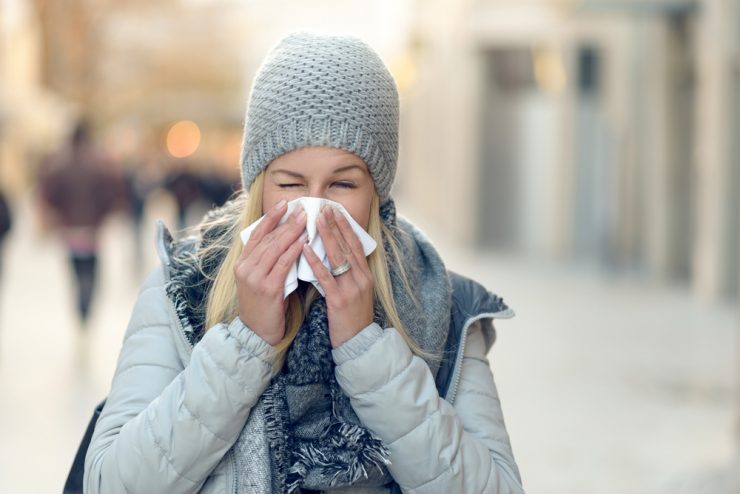Unless you’re very lucky – or super vigilant – chances are you will catch at least one cold over the next couple of months, and most of us will average two or three before the year is out.
Editor Jane Garton looks at ways to keep a check on winter bugs.
Getting cold doesn’t cause colds but a drop in body temperature can dent our immune system making us more susceptible to picking up one of the 200 or so different cold viruses circulating at this time of year. Combine this with being cooped up inside with other people who are coughing and sneezing and the lack of UV light via the sun to kill off viruses and you have the perfect recipe for a full-blown cold.
Although cold viruses can only multiply inside living cells, they can survive on surfaces such as phones, doorknobs, or keyboards. And before you know it you’ve picked one up on your hands. You can then infect yourself if you touch your nose or eye. The virus promptly travels down a tear duct into your nose.
Then it’s only a matter of time before the familiar symptoms of sore throat, runny or blocked nose, coughs and sneezes set in. The only sure way to avoid colds is to hole up somewhere remote and shun all human contact. But as that isn’t practical – or desirable – for most of us, here are some hot tips to help you stay cold free:
EAT WELL
Including plenty of fresh fruit and vegetables in your diet helps strengthen your immune system making it easier to fend off colds. Choose from a rainbow of colours to ensure you get a good range of immune-boosting antioxidant vitamins. Spinach, broccoli and cabbage, red peppers, squashes and sweet potatoes and fruit such as Cantaloupe melons, oranges and other citrus fruits, are all in season at this time of year. At least five portions (ideally more) a day should give you most of the nutrients you need. Add in some oily fish and protein for the perfect immune-boosting diet.
STAY HYDRATED
You need to drink plenty of fluids to help fend off infection, especially at this time of year when central heating can lead to dehydration. This in turn dries out the membranes of your nose so they are less able to withstand viral attack. Aim to drink around two and a half litres of water a day. Find plain water boring? Zip it up with a sliver of lemon or lime.
GET YOUR SHUT EYE
A good night’s sleep is essential as while you are sleeping levels of infection-fighting immune cells peak.. On the other hand burning the candle late into the night can reduce immunity leaving us more vulnerable to passing germs.
MOVE IT
Moderate exercise – think brisk walking, dancing swimming or cycling – can help boost resistance according to studies[i]. Aim for at least 30 minutes of activity most days of the week.
DESTRESS
Chronic stress exacerbates your body’s ability to fight off infections.If you’re feeling under pressure you’re more likely to go down with a cold than if you are relaxed and cheerful. It also exacerbates respiratory infections. Feeling the pressure? Try reading a book or taking a warm bath with essential oils. Socialising with friends, meditation and yoga can also help.
SUPPLEMENTARY MEASURES
Taking a good quality multivitamin and mineral supplement is vital at this time of year. It can be harder to get all the nutrients you need from fresh fruit and veg and your risk of infection is higher during the winter.
As well as a good quality multivitamin certain specific nutrients and herbs can help reduce your risk of the sniffles and sneezes:
Vitamin C – Countless studies show that vitamin C can help to boost the production of infection-fighting white blood cells. Look out for supplements containing bioflavanoids as these can enhance vitamin C absorption.
Echinacea – Echinacea is a potent immune booster and has proven antibacterial and antiviral properties. Take it as soon as you start to feel a cold coming on. [ii]
Pelargonium – Research shows that pelargonium helps to kick-start your body’s natural killer cells. It also helps to relieve typical cold symptoms such as a sore throat and nasal congestion[iii]. It may also put a stop to secondary infections such as bronchitis.
Probiotics such as lactobacilli and bifidobacteria can also help boost your body’s defences helping it to resist infection.[iv]
HOT TIPS
Wash hands often. Germ-contaminated surfaces like door handles and hand rails on buses, trains and escalators are rife with germs.
Quit smoking. Tobacco smoke irritates the lining of the nose and can change those hair-like cilia, which help to keep us cold free.
Go whole. Cut back on sugar and avoid processed foods. Load up on wholefoods, fruits and veg and protein.
Worry not. People who are happy, lively, and calm are more resistant to colds than those who are anxious, irritable, and depressed.
[i] https://www.ncbi.nlm.nih.gov/pmc/articles/PMC2629403/
[ii] https://www.ncbi.nlm.nih.gov/pubmed/29853961
[iii] www.ncbi.nlm.nih.gov/pubmed/29055287
[iv] [iv] Kim M, Galan C, Hill AA, Wu W-J, Fehlner-Peach H, Song HY, Schady D, Bettini ML, Simpson KW, Longman RS, Littman DR, Diehl GE (2018) Immunity July 2018 doi.org/10.1016/j.immuni.2018.05.00
























Add comment